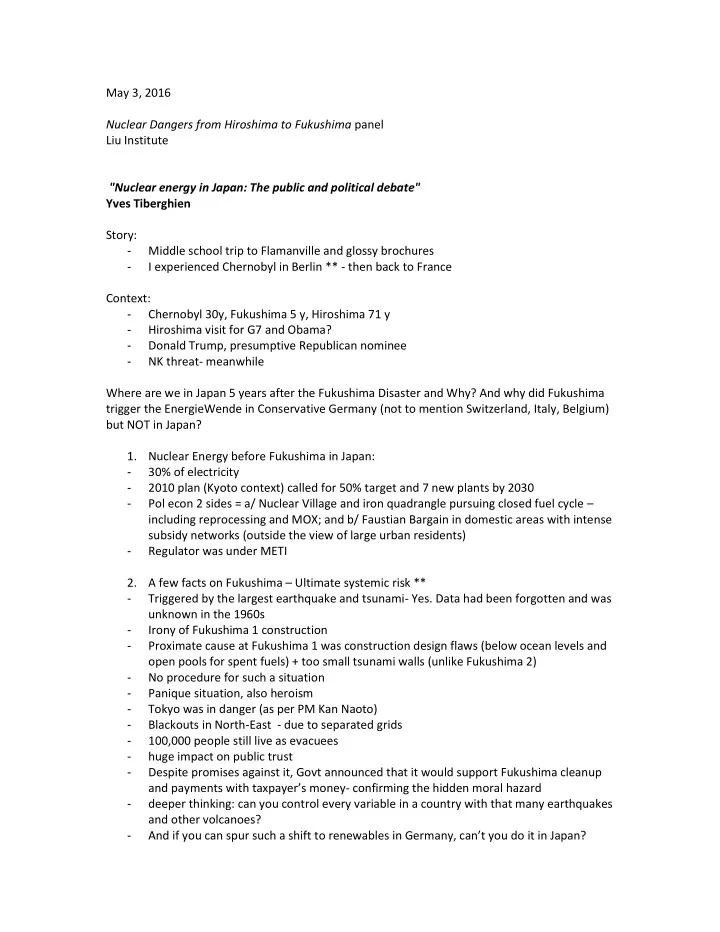

May 3, 2016 Nuclear Dangers from Hiroshima to Fukushima panel Liu Institute "Nuclear energy in Japan: The public and political debate" Yves Tiberghien Story: - Middle school trip to Flamanville and glossy brochures - I experienced Chernobyl in Berlin ** - then back to France Context: - Chernobyl 30y, Fukushima 5 y, Hiroshima 71 y - Hiroshima visit for G7 and Obama? - Donald Trump, presumptive Republican nominee - NK threat- meanwhile Where are we in Japan 5 years after the Fukushima Disaster and Why? And why did Fukushima trigger the EnergieWende in Conservative Germany (not to mention Switzerland, Italy, Belgium) but NOT in Japan? 1. Nuclear Energy before Fukushima in Japan: - 30% of electricity - 2010 plan (Kyoto context) called for 50% target and 7 new plants by 2030 - Pol econ 2 sides = a/ Nuclear Village and iron quadrangle pursuing closed fuel cycle – including reprocessing and MOX; and b/ Faustian Bargain in domestic areas with intense subsidy networks (outside the view of large urban residents) - Regulator was under METI 2. A few facts on Fukushima – Ultimate systemic risk ** - Triggered by the largest earthquake and tsunami- Yes. Data had been forgotten and was unknown in the 1960s - Irony of Fukushima 1 construction - Proximate cause at Fukushima 1 was construction design flaws (below ocean levels and open pools for spent fuels) + too small tsunami walls (unlike Fukushima 2) - No procedure for such a situation - Panique situation, also heroism - Tokyo was in danger (as per PM Kan Naoto) - Blackouts in North-East - due to separated grids - 100,000 people still live as evacuees - huge impact on public trust - Despite promises against it, Govt announced that it would support Fukushima cleanup and payments with taxpayer’s money - confirming the hidden moral hazard - deeper thinking: can you control every variable in a country with that many earthquakes and other volcanoes? - And if you can spur such a shift to renewables in Germany, can’t you do it in Japan?
3. Causes of Fukushima Disaster - nuclear village - closed system – opaque - no space for outsider elite and scientists (eg new data on tsunamis) - no clear enforcement power – overlapping incentives of regulator - moral hazard on financial side – asymmetry - Faustian bargain between large cities and rural areas - No oversight, either through civil society or otherwise (with exception of Courts) 4. Nuclear Policy Now under Abe - a/ Kan Naoto – both having lived through Fukushima and close ties to civil society initiated creation of NRA and froze all reactors. - datsu genpatsu – “escape from nuclear” – declaration of 2012 - Noda gently tried to reverse. - b/ Abe reverts and supports the business community and METI, but with the safeguard of a new independent NRA and tough standards - faced massive nuclear protests early on - issue did not figure in top 3 during last election - Feb 2014: Basic Energy Plan was made public, calling nuclear an “impor tant baseload electricity source”. - ST- target restart of 12 (out of 50) reactors. 5. Reality today- 2016 - Satsuma-Sendai (Kagoshima Prefecture): 2 reactors functioning. - April 2016: Fukuoka High Court rejected appeal by Kyushu residents about the Sendai reactors. - March 2016: Otsu Court suspended operations of 2 reactors at Takahama plant in Fukui prefecture (Kansai) - Debate about NRA safety standards + evacuation plans (not covered by NRA standards) for residents + impact of volcano in Satsuma-jima 6. Causes of this Inertia: - a/ NOT public opinion because opposition to restart - Aug 25, 2015 Asahi poll: 30% support for restarts ,49% opposition (Kyushu); and for other nuclear plants: 28% support, 55% opposition - b/ United nuclear industry and business community – nuclear village is powerful - c/ Weak media in Japan- Kisha club hence low salience now in public opinion - d/ weak civil society mechanisms - all in all – suppression of public voice - AND (like France) organization theory – strong set of norms and institutions embedded in the State. - Interesting battle in Taiwan about this issue now 7. Thoughts on Nuclear weapons: - 1998 poll Gallup: 90% of Japanese opposed having nuclear weapons, 10% thought it would be necessary
- 2005 data NHK: 78% vs 18% OK - A deep issue: Japan separating plutonium and accumulating 10 tons already, with the aim to produce MOX and have infinite fuel in the future. Rokkasho reprocessing plant that is schedule to produce plutonium- a big risk and bad example. Bureaucracy is devoted to it.
Recommend
More recommend